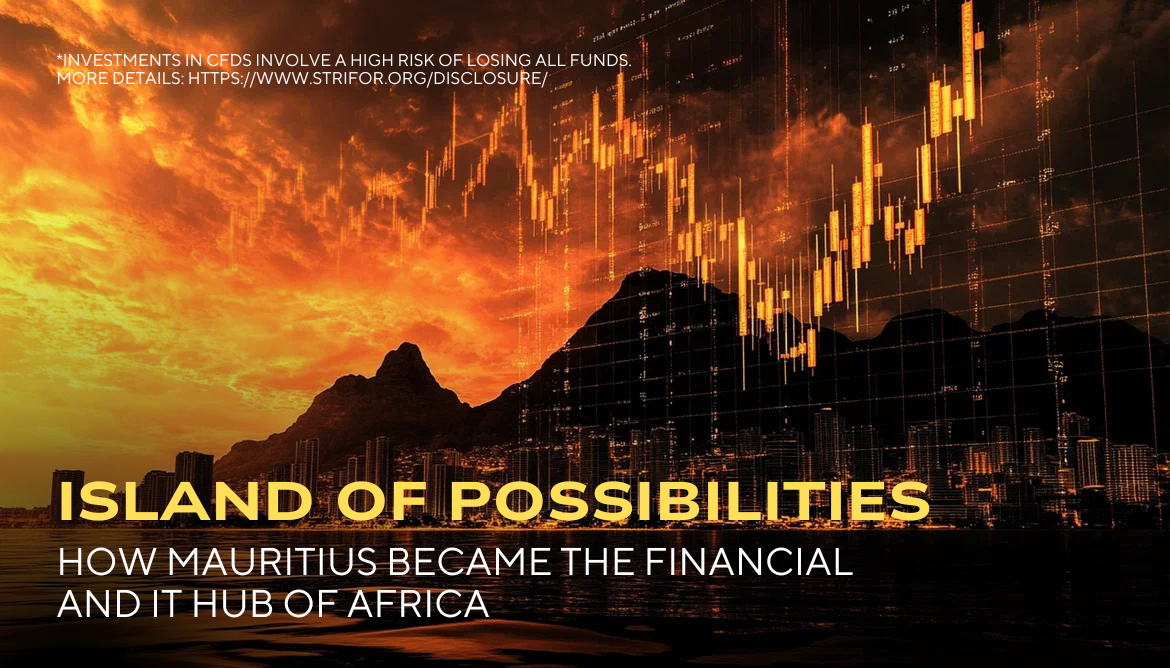
ISLAND OF POSSIBILITIES – How Mauritius became the financial and IT hub of Africa
Mauritius, a small island in the Indian Ocean, has become an economic miracle. Known for its beaches and resorts, it is also positioned as the financial and IT hub of the region, as well as being the leading country in terms of wealth per capita in Africa. In today’s Strifor review, let’s take a look at how the country has attracted investment from around the world thanks to its political stability, sound economic policies and strategic location.
Historical context
Mauritius’ economy was originally centered on the sugar industry, started during the colonial period under the British protectorate. After independence in 1968, the country began to actively diversify its economy, which allowed it to avoid the trap of a mono-economy. Since the late 20th century, Mauritius has focused on developing services, becoming a financial and IT center.
Main economic features
Financial Services Sector
Mauritius acts as an international financial center, serving markets in Africa, Asia and elsewhere.
- Tax advantages: low corporate tax rate (15%) and an extensive network of double tax treaties attract companies to incorporate.
- Investment bridge to Africa: Mauritius funds channel a significant portion of foreign investment into African countries, including Kenya, South Africa and Nigeria.
- Regulation: the country strictly regulates the financial sector, providing transparency and reliability, which is particularly important for international investors. It is in this country that broker Stryfor obtained its license and is regulated by the Mauritius Securities Commission*.
IT sector
The government of Mauritius is focusing on digitalization and IT development.
- Technoparks and incubators: Cyber City in Ebene is a hub for IT companies, providing innovative solutions for the region.
- Outsourcing: thanks to English-speaking workers and affordable prices, many companies from Europe and Asia locate their data and support centers in Mauritius.
- Startup ecosystem: special funding programs and tax incentives encourage the development of local IT companies.
Tourism sector
Although tourism has a significant place in the economy, the authorities are seeking to diversify the economic base to reduce dependence on tourists.
Sugar industry
Historically, sugar was the country’s main export product. Today, sugar’s share of the economy is declining, but it remains an important element of the agricultural sector.
Financial sector: focus on innovation
Mauritius is actively promoting digital financial technologies:
- Fintech: a growing segment that includes electronic payments, microcredit and blockchain solutions.
- Cryptocurrencies and blockchain: the government supports the regulation of cryptocurrencies, creating an enabling environment for their use and development.
- Investment funds: The island has become a key hub for hedge funds and African asset companies.
IT as a driver of the economy
- Partnerships with international companies
Google, IBM, Microsoft and other major companies are already operating in Mauritius, developing local teams and integrating the island into the global digital ecosystem.
- Human resource potential
High levels of education and government IT training programs help the island remain competitive.
- Developing innovation
- Artificial intelligence and data analytics have become some of the key areas being developed in the technology parks.
- IT infrastructure is supported by high-speed internet and modern data centers.
Competition
Despite its successes, Mauritius faces competition:
- Rwanda is actively developing its IT industry.
- Seychelles is trying to offer similar conditions for doing business.
- Kenya is becoming a leader in mobile payments and financial technology.
Statistics and achievements
- GDP per capita: $31,157, 1st place in Africa
- Ease of Doing Business Index: Mauritius ranks 1st in Africa and 13th in the world.
To summarize
Mauritius is a unique example of how a small country can use its advantages to create a competitive economy. With a focus on international investment, exports, tourism, the financial sector and IT, the island continues to attract investment and technology. However, to maintain its position, Mauritius needs to meet the challenges of global competition and maintain a high level of innovation.
Strifor broker shares the Mauritius regulators’ principles of financial openness and security and is therefore regulated by the Mauritius Securities Commission. Trade CFDs on financial markets safely, because Strifor always pays!
Attention! An investment in CFDs carries the high risk of losing all investment funds. 87% of retail investor accounts lose money when trading CFDs with this provider. Past investment success does not mean future success.
* 7 Lucky Trading (Mauritius) Ltd, the operator of the Strifor platform, has a license to operate
forex broker No. GB23202670 and is regulated by the Mauritius Financial Services Commission.

 Personal area
Personal area





